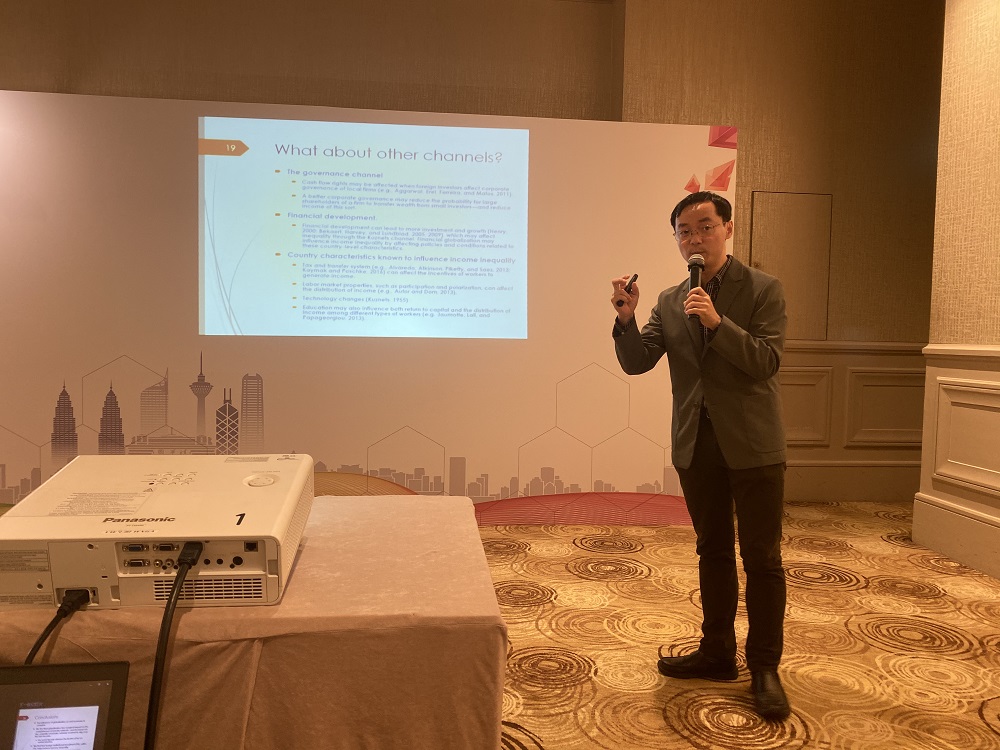On November 9, 2019, the “Belt and Road” Initiative Forum of the financial development forum series at Tsinghua PBCSF was held in Singapore. Hong Zhang, Chair Professor of Finance at Tsinghua PBCSF and Director of the China Finance Case Center, was invited to give a keynote speech on international investment and globalization. Kan Cai, Associate Director of Tsinghua PBCSF’s Finance EMBA Center, hosted the Forum.
Professor Zhang’s research covers international finance, financial institutions/governance, investment (particularly mutual funds and hedge funds) and corporate finance. His paper, “Estimating the Dynamics of Mutual Fund Alphas and Betas,” written in collaboration with Mamaysky and Spiegel, was cited in the New York Times (May 18, 2003) and Financial Advisor Magazine (June 2004) as to "have solved a big problem for mutual fund rating systems." His recent work examines the impacts of market designs (e.g., institutions, global short selling, global competition, and currency benchmarking) and investor heterogeneity (e.g., hot money and cold money) on managerial incentives and performance. His research is published in top finance journals such as Review of Financial Studies, Journal of Financial Economics, Journal of Financial and Quantitative Analysis, and Review of Finance.

Professor Hong Zhang’s Keynote Speech
Professor Hong Zhang analyzed and reflected on the impact of globalization from the production end (the development and change of industrial network structure) and income end (wealth distribution) in detail. He argued that the globalization of the past 20 or 30 years has had a crucial impact on the completeness of many countries' own industrial networks and their relative centrality to global industries. By comparing the completeness of industrial networks of different countries in 1997 and 2017, it can be seen that globalization has benefited many backward countries: their relatively simple industrial networks have become more complete in the process of globalization. However, the impact of globalization on the relative position of each country (especially the United States) in the global industry showed opposite trends from 1998-2007 and 2007-2018, indicating that the impact of globalization on the productive end of the real economy was more complex.
With respect to wealth distribution, Professor Hong Zhang used empirical research to study the impact of financial asset globalization on income inequality. He pointed out that while past experience suggests that globalization led by foreign direct investment (FDI) increases inequality in countries, his latest data and research suggest that globalization of financial assets led by institutional investors in fact reduces inequality. This finding suggests that different approaches to globalization may have different effects on the distribution of income within countries. After his keynote speech, Tunku Ali Redhauddin, student of the first class of the BRI EMBA Program and Chairman of Bumi Armada Berhad, Malaysia's international offshore energy facility and service provider, MX Kuok, Director of Shangri-la Group and K3 Ventures, and Jefferson Chen, BRI EMBA’s second class student and founder/CEO of ADVANCE. AI shared with the audience their learning experiences and gains at Tsinghua PBCSF. They said it was great to go back to school, not only to rediscover new knowledge, but also to learn a lot from the communication between students and make progress together.
Left to right: Tunku Ali Redhauddin, MX Kuok, Jefferson Chen
Kan Cai gave a brief introduction on the PBC School of finance and its “Belt and Road Initiative” EMBA Program. He remarked that the Program was the first BRI-themed program pioneered at PBCSF in 2017. Integrating the substantial academic resources of Tsinghua University and industry expertise of the Graduate School of the People’s Bank of China, and building on years of teaching experience and thousands of alumni, the Program creates a learning and exchange platform for entrepreneurs in China and countries along the "Belt and Road", deepens both sides’ overall understanding of Asia’s regional economies and each country’s national conditions, promotes people-to-people exchanges, international cooperation, and lets students jointly explore new opportunities under the "Belt and Road" Initiative.
Based on the traditional curriculum of Tsinghua PBCSF’s Finance EMBA Program, the BRI EMBA Program incorporated cross-regional course modules, covering locations such as mainland China, Malaysia, Singapore, Indonesia, Thailand, Vietnam, the Philippines, China Taiwan, China Hong Kong and other major countries and regions along the "Belt and Road". By visiting local financial institutions and leading enterprises and engaging in dialogues with local business leaders, students gain a comprehensive and rapid understanding of the Southeast Asia economic environment, regional trade and capital markets, as well as layout optimization for cross-regional enterprises.
Since its inception in May, 2017, the BRI EMBA Program has attracted more than 180 enterprise high-level decision-makers from 22 countries and regions, including Singapore, Indonesia, Malaysia, Thailand, the United States, Canada, Kyrgyzstan, Kazakhstan. A number of students from Southeast Asian Countries hold Tan Sri, Dato' Sri, Dato’, Tengku and other honorary titles. Nearly 40% of the students graduated from world-renowned universities such as MIT, Stanford, Harvard, Yale, Cornell, Oxford, Cambridge and Imperial College London.